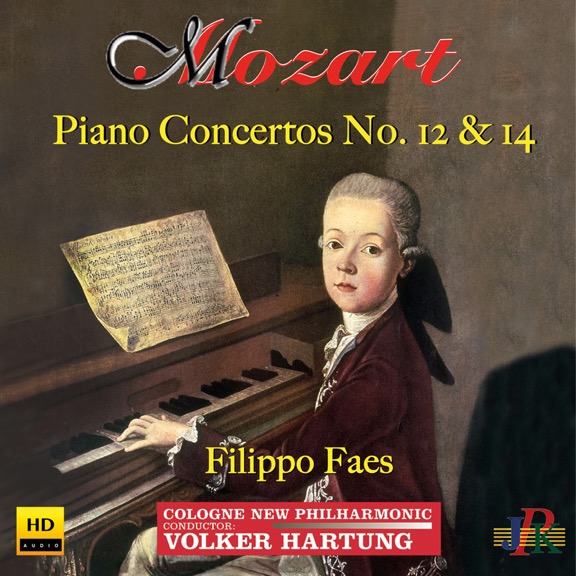NEUES ALBUM ERSCHIENEN: MOZART KLAVIERKONZERTE NR. 12 & 14 MIT FILIPPO FAES
18/11/23 08:54

NEUES ALBUM VERÖFFENTLICHT:
WOLFGANG AMADEUS MOZART
KLAVIERKONZERTE NR.12 IN A-Dur KV 414 &
Nr.14 in ES-DUR KV 449
JPK 12 01 23
Now available for streaming & download
Erhältlich zum Streamen und Herunterladen The purchase from iTunes includes the extensive booklet for free download Der Kauf des Albums von Apple Music beinhaltet ein umfangreiches Booklet zum kostenlosen Download
Mozart's 12th Piano Concerto, like the piano concerto No.14 K. 449, is still part of the early Viennese concertos. Still, in terms of content and form, it moves further away from this creative phase and points to the second group of Viennese concertos, which begins with the 15th Piano Concerto. He wrote both concertos as early as 1782.
With the 14th Piano Concerto, Mozart is at the crossroads from the old form to a new classical concept of the piano concerto. He states that he treats the wind instruments ad libitum one last time. In a letter to his father in 1784, Mozart reported: "This is a concerto of an extraordinary kind, and written more for a small than a large orchestra." The accompaniment can also be played with string instruments. In this recording, K. 414 is played with an accompanying string orchestra, whereas K.415 is presented with a full orchestra, including wind players.
The soloist is the celebrated Italian Pianist Filippo Faes, one of the long-time favorite artists performing Volker Hartung and his Cologne New Philharmonic Orchestra.
Mozarts 12. Klavierkonzert gehört ebenso wie das Klavierkonzert Nr. 14 KV 449 zu den frühen Wiener Konzerten. Inhaltlich und formal entfernt sie sich jedoch weiter von dieser Schaffensphase und verweist auf die zweite Gruppe Wiener Konzerte, die mit dem 15. Klavierkonzert beginnt. Beide Konzerte schrieb er bereits 1782. Mit dem 14. Klavierkonzert steht Mozart an der Schnittstelle von der alten Form zu einer neuen klassischen Konzeption des Klavierkonzerts. Er gibt an, die Blasinstrumente ein letztes Mal ad libitum zu behandeln. In einem Brief an seinen Vater schrieb Mozart 1784: "Dies ist ein Konzert von außerordentlicher Art, das mehr für ein kleines als für ein großes Orchester geschrieben ist."
Die Begleitung kann auch mit Streichinstrumenten gespielt werden. In dieser Aufnahme wird KV 414 mit einem begleitenden Streichorchester gespielt, während KV 415 mit einem kompletten Orchester einschließlich Bläsern präsentiert wird.
Solist ist der gefeierte italienische Pianist Filippo Faes, einer der langjährigen Lieblingskünstler von Volker Hartung und Junge Philharmonie Köln.
